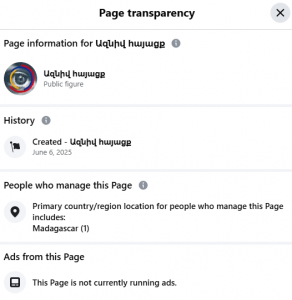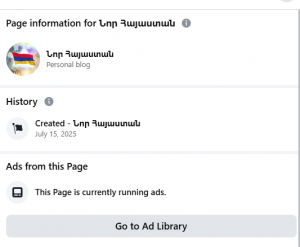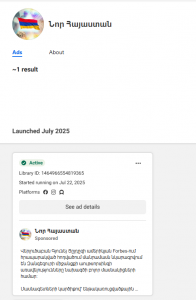Newly created pages carrying out pro-Turkish propaganda have appeared on Facebook, targeting the Armenian-speaking audience. They share a number of technical and content similarities.
In particular, two pages created in June-July have come under the monitoring of the Fact Investigation Platform, which with a very small number of followers, distribute their content mainly through Facebook advertising.
The few posts shared by the pages, touching upon the Middle Corridor and its small section passing through the Syunik region, circulate exclusively Turkish propaganda theses on the subject matter.
Pro-Turkish propaganda from Madagascar
Thus, the pages that came to the attention of FIP.am were created in the same period, in June-July 2025, and the first post was made in July following the American offer to lease the Syunik road that recently appeared in the media.
One of the propaganda pages called “Honest View” was created on June 6, 2025, and has only 6 followers as of the moment.

The page features only two posts one of them concerning the recent visit of the Prime Minister of Armenia Nikol Pashinyan to Brussels, the other one addressing the offer to outsource the road passing through Syunik to the United States.
The page had been running ads for the latter for days, receiving numerous likes, comments, and shares.
It is also noteworthy that the page is being run from Madagascar and has only one admin.
The other propaganda page, called “New Armenia,” was created on July 15. Information about the page’s coordinators and its geographic location is closed.

At the moment, content circulated by the page is being sponsored; the post reproduces an analytical article by a Turkish journalist in Forbes, which presents the countries and superpowers in the region, the possible losses and benefits from the opening of the Middle Corridor, including its road through Syunik region.

What theses do the pages promote?
Thus, in one of the posts published in “Honest View” theses with inherent Turkish propaganda component are being promoted.
“…The outsourcing of the control of a country’s territory to a foreign company for its more efficient economic use is a well-known practice in history. For example, the Panama Canal was handed over to the United States from 1914 to 1999. At the same time, its territory was initially part of Colombia, and almost a century later it became part of Panama…”
First, outsourcing a country’s sovereign infrastructure to the control of an international company or other country or private company is portrayed as a natural and common international practice. The examples chosen, namely the outsourcing of the Panama and Suez Canals, pursue this objective.
Even more so, this aims to shift the idea of the transfer of a country’s sovereign territory for long-term lease potentially being risky.
“…There is no need to worry about the fact that the Republic of Turkiye initiated the outsourcing by inviting an American operator…”
This thesis portrays Turkiye’s initiative not as a threat, but as a shared regional interest. At the same time, Turkiye is pictured as a regional driving force, whose policies can benefit countries.
“All other countries in the region…will benefit from Turkiye‘s growing economic and geopolitical power.”
It is also noteworthy that the outsourcing agenda is rendered as a Turkish initiative with an emphasis on the thesis that “Turkiye is the key actor, while others are the beneficiaries.”
The opening of the corridor in the context of the unification of the Turkic world
As mentioned above, the “New Armenia” page reproduced the article by Turkish author Güney Yıldız from Forbes capturing only the part with economic calculations.
It should be noted that in the full body of the article, the opening of the Middle Corridor manifests itself as a means of unifying the Turkic world and strengthening Turkiye’s strategic position with a propaganda message at the core.
At the same time, in the article and in its title, the Turkish journalist refers to Armenia’s Syunik region as Zangezur* (it is the Turkic version of the Armenian Dzagedzor).
The article also uses a graphic map from the Turkish state-run Anadolu Agency presenting the unblocking of regional communications in Turkish-Azerbaijani terms, in particular, the so-called “Zangezur Corridor” term, which is unacceptable to official Yerevan.
Thus, alongside the publication of the American proposal to unblock regional communications and outsource the road through Syunik, newly created pages in the Armenian-speaking domain of Facebook have set the pro-Turkish propaganda in motion.
Nane Manasyan

 FACTOMETER
FACTOMETER









